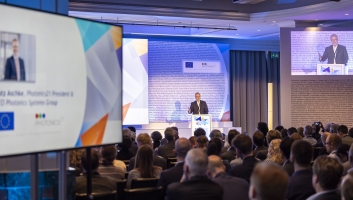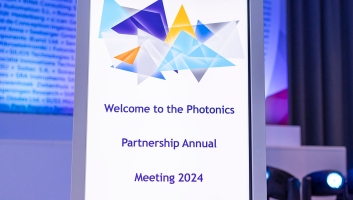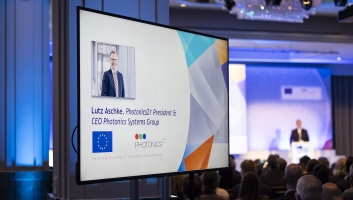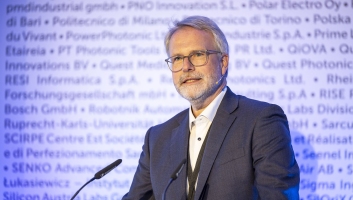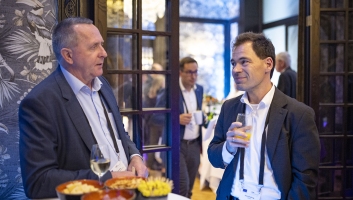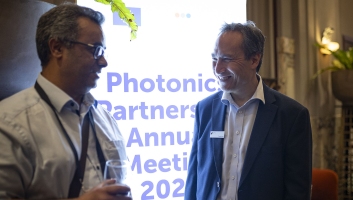More than 220 high-ranking photonics representatives from industry, science and politics debated the future of light technologies, including technological sovereignty and the global photonics industry at the Photonics Partnership Annual Meeting in Brussels on 14 and 15 May. The Annual Meeting is one of the most important events for the European photonics community.
Photonics21 President Lutz Aschke opened the event by giving a short review of the past year: “Our committed workgroup chairs and members immersed themselves in numerous workshops, exploring research and innovation priority proposals. These proposals serve as the foundation for future Photonics Partnership calls, paving the way for groundbreaking advancements.”
New photonics market study
According to a new photonics market study published by Photonics21 and conducted by the French market intelligence group Tematys, the photonics industries in Europe, Asia, and the US remained robust during 2019-2022 – a period plagued by some of the toughest global and economic tensions after decades of geoeconomics and globalisation. Called “Insights into the Dynamic Photonics Market (2019-2022)”, the new study shows the photonics industry worldwide grew from the previous 2015-2018 study despite geopolitical risks such as COVID-19 (with many countries closing their borders and restricting travel to control the spread of the virus), global inflation affecting economies worldwide, and the war in Ukraine hindering trade.
The study reveals substantial growth and development in European photonics between 2019 and 2022. Key highlights include:
- Thousands of extra Jobs – Employment surged by 35,000 jobs during this period, far exceeding the growth rate of European manufacturing as a whole.
- Industry Volume – European photonics production soared to €124.6 billion in 2022, representing over 5,000 companies and contributing significantly to Europe’s manufacturing landscape.
- Annual Revenue Growth – The sector witnessed a remarkable annual revenue growth rate of 6.5% (2019-2022), outpacing Europe’s GDP growth even after accounting for inflation.
- Market Share – Europe maintained a strong position as the second-largest player in the global photonics market (15% share), underscoring its competitiveness against major counterparts like China and the United States.
- Innovation and R&D – The European photonics industry exhibits a strong commitment to research and innovation, with an R&D intensity of 10.5%, significantly higher than other industries.
New study about the Chinese photonics industry
Daniela Bartscher-Herold, Founder and Partner EAC Munich, gave a presentation about political steering processes in China in core segments of photonics industry. The EAC study, commissioned by Photonics21, analyses how China will develop as an economic powerhouse in global context, what key industrial development plans will steer the Chinese photonics industry and how technology roadmaps may look like.
Key highlights include:
- Market Share – China has rapidly gained market share in photonics over the last years – thumb rule: “3x3” – in terms of growth and dedicated photonics projects
- Geopolitics – Intensified global political tension does not affect the position of China being the largest market, but the mandatory rebalancing for photonics players value chain opens up new opportunities in the industry
- Local and regional funding – Compared to EAC’s investigation in 2015, China’s funds for photonics are currently more raised by local governments and regional clusters with a capital scale much larger than national funds
- Chinese policies – Having no dedicated “China Chip Act”, 4 key national plans instead support the development in the photonics industry aiming for solving bottleneck problem and reducing reliance on foreign technology
- Segments – The photonics market in China is market-driven, and strongly applied in industries and consumer markets, e.g. displays, lighting, IT, telecom, photovoltaics and production tech (laser), etc.
- Technology roadmap – China will focus their investment on tackling technological bottlenecks along the entire photonics value chain
Keynote speeches and panel discussion addressing the future of photonics
In his keynote, the new Head of Unit for Microelectronics and Photonics Industry at the European Commission, Pierre Chastanet highlighted where photonics could play an important role in the European Chips Joint Undertaking. According to the EC’s view, the EU Chips Act provides a framework to strengthen integrated photonics activities. Chastanet added that the results of R&I projects in Horizon Europe have reached the technological maturity to be industrially relevant: “Joint R&I is essential for the co-integration of photonics and electronics,” he said. In his view, the challenges of mass production at wafer scale are better addressed in the Chips JU.
Michelangelo Masini, Head of Research and Technology at Carl Zeiss AG, gave a keynote speech about photonics and its power of resilience and transformation and made a stance for increasing Europe’s attractiveness for the best talents so that the next big innovations will happen in Europe.
In the panel discussion "Quo Vadis Photonics?", the industrial strategy of photonics in Europe and in the US was debated. Photonics is seen as one of the jewels of the European industry. However, workforce is lacking, and market shares are stagnating in Europe and in the US. Kent Rochford, CEO & Executive Director SPIE advocated for more international cooperation and partnerships with like-minded countries to accelerate further innovation in photonics. In his view, cooperation is necessary to advance innovations faster and better. He also called for a better explanation to policymakers of how photonics solves societal challenges. Ioanna Zergioti, Co-founder, CEO & CTO PhosPrint and Professor at the National Technical University of Athens argued that start-ups in the European photonics ecosystem need to be strengthened in terms of resilient supply chains, component costs and funding. Her wish for the next Framework Programme is to see more flexibility and more competitiveness of founders. The pressing issue of limited workforce and how to overcome this was addressed by Michelangelo Masini (Zeiss AG) arguing for European centers of excellence that attract diverse, multidisciplinary, attractive, and solution-oriented talents.
Photonics21 Innovation Award 2024
The Photonics21 Innovation Award 2024 was awarded to Hamidreza Neshasteh on behalf of the team of CNRS researchers at Matériaux et Phénomènes Quantiques, Paris with a prize money of €5,000 honouring their outstanding research on micron-scale laboratory housed on a single miniature disk. The project "Micron-Scale Lab on a Disk for Sensing" leverages probe's multifunctionality, together with advanced optical transduction technique, to envision a single photonic chip capable of measuring various properties of both liquid and gaseous environments, thus offering an easy-to-use, compact, and low-cost universal probe. This breakthrough technology includes optical, thermal, and rheological sensors equipped with real-time measurement capabilities. In addition, the silicon-based probe ensures compatibility with CMOS technology and microfluidics, and can be integrated into existing lab-on-a-chip platforms. These features highlight the versatility and scalability of an innovative sensing solution.
Photonics21 President Lutz Aschke and Roberta Ramponi, Photonics21 Chair of the Selection Committee and Professor at Politecnico di Milano, handed over the Innovation Award to the winner.
Photonics21 expressed gratitude to Giorgio Anania, a founding member of the organization, “who has been shaping the Photonics21 Executive Board for over 18 years.”
Funding opportunities in other partnerships or initiatives
The workshop sessions on the second day of the Annual Meeting focused on funding opportunities in other partnerships or initiatives related to the seven Photonics21 Working Groups as well as contributions from selected Photonics Public Private Partnership projects which has received funding from the European Union's Horizon 2020 Research and Innovation Programme. GRAPH-X, MultiLab, Phabulous, PROMETHEUS, PHOENIX, all gave interesting updates on their progress.

